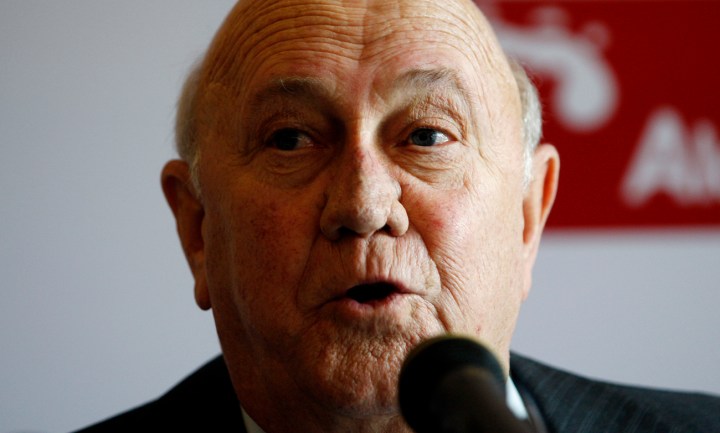Politics, South Africa
Reporter’s Notebook: Doorstopping De Klerk

When FW De Klerk agreed to do his friends at the South African Gold Coin Exchange a favour and cut the ribbon on their 30th Scoin shop, you can be sure he wasn’t betting on being at the centre of a media storm that had erupted four days previously. REBECCA DAVIS probably wouldn’t have been there otherwise.
It must have been a fairly tense few days for Frederik Willem de Klerk, but he was doing a good job of hiding the strain when he turned out at Cape Town’s Waterfront on Monday for a shop opening. Former president De Klerk made headlines worldwide this weekend thanks to the interview he gave CNN’s Christiane Amanpour on Friday in Chicago, in which he appeared to defend the Bantustan system.
In the course of the interview, the full transcript of which is available here, Amanpour said to de Klerk: “I’m offering you the opportunity as the person who helped dismantle apartheid to say whether or not you believed that it was also morally repugnant, today, in retrospect.”
De Klerk responded: “I can only say that in a qualified way. Inasmuch as it trampled human rights, it was – and remains – and that I’ve said also publicly – morally indefensible… But the concept of giving, as the Czechs have it now and the Slovaks have it, of saying that ethnic unities with one culture, with one language, can be happy and can fulfil their democratic aspirations in an own state, that is not repugnant.”
De Klerk went on to defend the Bantustans in terms of services and facilities, saying “if only the developed world would pour so much money into Africa, which is struggling with poverty, as we poured into those homelands to develop”.
He denied that the delays in progress to an equitable society had anything to do with the transition process, saying that “The main failure, why we haven’t made better progress, does not lie in any way whatsoever in the agreements we reached, which we negotiated between 1990 and 1994 and 1996.”
De Klerk did admit, however, that “with the advantage of hindsight, we should have started the reform much earlier. We should have gone much earlier with the flow when the winds of change blew across Africa”. If we assume that to be a reference to Harold Macmillan’s ‘Winds of Change’ speech, given by the British Prime Minister in Cape Town in 1960, then De Klerk himself would never have had the chance to become president, since he only took power in 1989.
His comments caused a furore, which shows no sign of dying down just yet – on Sunday the National Health and Allied Workers’ Union demanded that De Klerk’s Nobel Peace Prize be retracted, calling him “an unapologetic proponent of a racist, fascist system that oppressed the majority”. In an editorial published on Monday, The Sowetan described De Klerk as “a political hypocrite” and demanded that he apologise “for insulting not only all South Africans, but the essence of the non-racial, united South Africa”.
You can bet your house on the fact that there won’t be any such apology forthcoming from De Klerk Inc. The De Klerk Foundation reacted immediately to try to douse the flames, publishing a statement that amounted to: “I’m sorry…that you so wilfully misunderstood me”. The Foundation announced that it “regrets that the comments that FW de Klerk made in his recent interview with Christianne [sic] Amanpour of CNN have been taken so unfairly out of context”.
This seems a dubious claim, given that the transcript is available for all to read. It’s also undermined by the fact that the statement goes on to take a stab at defending the Bantustan system, citing the “great deal of effort and money” invested in them, and endorsing “the idea that the problems of territories that include different peoples should be addressed on the basis of territorial partition”. It concludes, however, that “what motivated [De Klerk] as a young man ceased many years ago to motivate him as a political leader”.
With all this as background, little wonder that the opening of the Waterfront’s Scoin shop attracted quite a huddle of journalists waiting for De Klerk’s arrival. I owe it to the nice PR people of Scoin to report to you that their new outlet is indeed “well situated, light, airy and attractive to existing and prospective customers”, to quote their marketing material.
I can recommend no better place at which to shop for commemorative gold coins, some of which were on display in the window for R300,000. One of Scoin’s flagship ranges is their ‘Unique Laureates Twin Set’ collection, commemorating two Nobel Peace Prize Laureates “for their non-violent struggle towards democracy”. Mandela and De Klerk? Nope, Mandela and Aung San Suu Kyi. You’ve got to wonder if De Klerk is a bit peeved.
He arrived with little fanfare, seemingly in fine fettle, smiling and joking as he shook hands. Addressing the small group, the “former Prime Minister”, as he was unfortunately introduced, was quick to clarify: “I don’t make a habit of opening new shops”, but explained that he came along as a thank you for the help the South African Gold Coin Exchange has given his Foundation and the Nobel Peace Prize. He suggested that the commemorative coins “represent to a certain extent some of the good things in South Africa”, and that foreigners buying them “take a message of goodwill and reconciliation home with them.”
“We need good news at this time, because there’s a lot of bad news about South Africa,” he continued, before singing the praises of the coins a little more. Then he laid on some feel-good stuff pretty thick. “We are facing big challenges at the moment. I think we are up to those challenges, provided we do the right thing now.
“Civil society is poised to be helpful, we are all poised to take hands to work together to make our country an even better place and to take it into the future so that it can fulfil its wonderful potential. That is to remain, and grow even stronger, as the entrance to sub-Saharan Africa, the portal, as the growth-point for sub-Saharan Africa, and as an example to the rest of Africa.”
All of this represented a lot more rosy rhetoric than he gave Amanpour, to whom he said that South Africa was “a solid democracy… but not a healthy democracy”.
De Klerk cut the store’s ribbon, while the journalists gathered like vultures. He knew what was coming. Turning to address us like a strict headmaster, he warned: “This is a doorstop. I am not here to give long interviews.”
He said he had not written the statement by the FW de Klerk Foundation, but he endorsed it fully. He repeated the claim that his comments had been taken out of context, and accused people of engaging in “twisted interpretations”. After all, he said, “I was the one who for all practical purposes abolished apartheid. Why would I have nostalgia for that which I abolished?”
And with that, De Klerk strode firmly away to press the hands of supporters. As I left, an Afrikaans woman was earnestly expressing her loyalty to him. In a taxi on the way home, I asked the driver – a coloured woman – what she thought of FW de Klerk.
“Why are you asking?” she inquired suspiciously, eyeballing me in the mirror. I explained that he was in the Waterfront at that moment. She shrieked with excitement.
“He was a good president,” she said. “My whole family voted for him. That was the last election we voted in. De Klerk said that the country belonged to everyone: black, white coloured, Hindu.”
After I got out of the taxi, she turned around to return to the Waterfront in the hope of spotting him. DM
Read more:
- Transcript of FW De Klerk’s interview with Christiane Amanpour, on CNN.
- FW De Klerk foundation statement.
- A political hypocrite in the Sowetan.
Photo: Former South African President and Nobel Peace Prize laureate Frederik Willem de Klerk speaks during a news conference in Bogota May 18, 2009. De Klerk is in Colombia to take part in a forum organized by the newspaper El Espectador. REUTERS/Jose Miguel Gomez.





 Become an Insider
Become an Insider